In this comprehensive guide, we’ll explore practical strategies for building parent-teacher relationships that create a supportive network around each student. Whether you’re a new teacher or a veteran educator looking to strengthen your parent communication approach, these evidence-based techniques will help you foster meaningful connections that benefit everyone involved.
Why Building Parent-Teacher Relationships Matters for Student Success
When teachers and parents work together, students thrive. Research from Harvard University shows that strong parent-teacher relationships lead to improved academic performance, better attendance, more positive student attitudes, and higher graduation rates. These benefits extend across all grade levels, from kindergarten through high school.
Building parent-teacher relationships creates a consistent support system that helps students navigate both academic and social challenges. When parents and teachers communicate effectively, they can address issues quickly before they become major obstacles to learning. This collaborative approach also helps students develop a positive attitude toward education.
Effective teacher skills in parent communication lead to several key benefits:
- Improved student academic performance and engagement
- Increased parent involvement in learning activities
- Better understanding of students’ individual needs
- More consistent behavioral expectations between home and school
- Enhanced problem-solving when challenges arise
- Greater trust between families and school staff
Teachers who excel at building parent-teacher relationships often find that their classroom management becomes easier as well. When parents understand and support classroom expectations, students receive consistent messages about appropriate behavior and academic effort.
The foundation of these relationships is mutual respect and a shared commitment to student success. By investing time in building parent-teacher relationships early in the school year, educators create a positive framework for addressing both challenges and celebrations throughout the academic year.
Essential Teacher Skills for Building Parent-Teacher Relationships Through Communication
Effective communication forms the backbone of strong parent-teacher relationships. The most successful educators develop specific teacher skills that help them connect with families from diverse backgrounds and circumstances. These skills can be learned and refined throughout your teaching career.
Start with Positive Communication
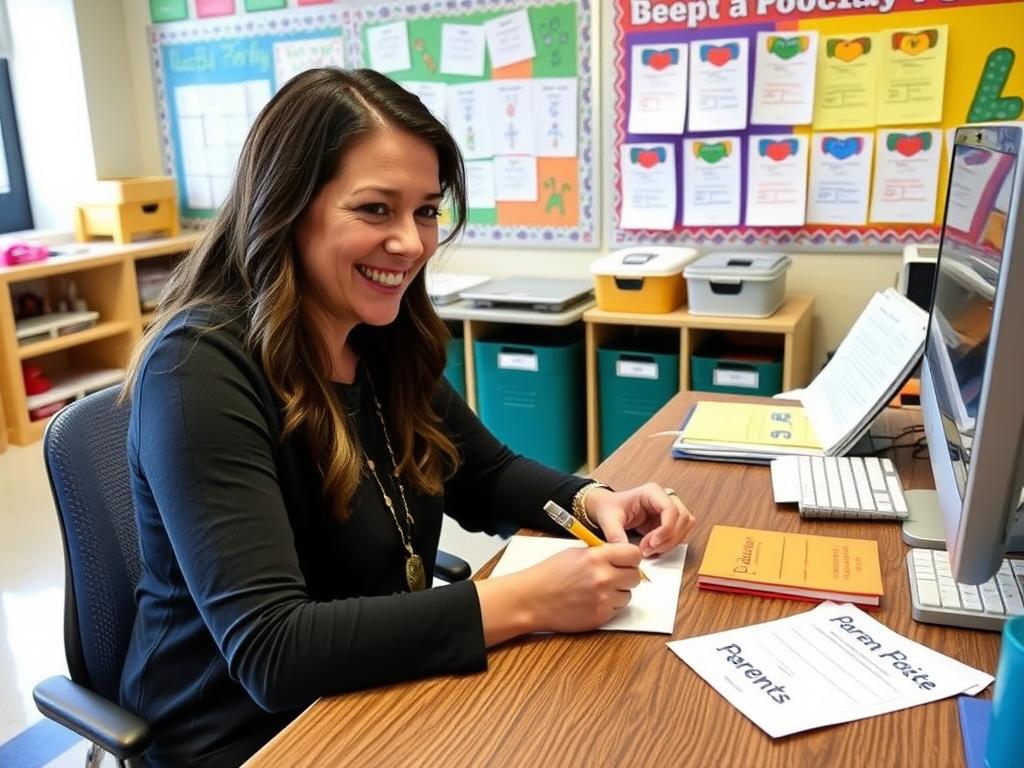
One of the most effective teacher skills is initiating positive contact with parents before any issues arise. This establishes goodwill and makes subsequent conversations more productive, even when addressing challenges.
- Send a welcome email or letter introducing yourself before school starts
- Share good news about student achievements regularly
- Recognize improvement, not just excellence
- Communicate in the parents’ preferred format (email, phone, text, app)
- Keep messages brief but specific about what the student did well
For example, a quick email saying, “I wanted to let you know that Jamie showed incredible perseverance during our math lesson today. He struggled with the new concept but kept trying different approaches until he succeeded!” takes just moments to write but builds tremendous goodwill.
Use Clear, Accessible Language
Educational jargon can create barriers between teachers and parents. Developing teacher skills in clear communication helps ensure all parents understand important information, regardless of their educational background or familiarity with school terminology.
- Avoid acronyms and specialized terminology without explanation
- Use straightforward language that’s professional but not overly formal
- Provide context for curriculum terms (e.g., “phonemic awareness—the ability to hear and manipulate individual sounds in words”)
- Consider translation needs for multilingual families
Listen Actively and Empathetically
Building parent-teacher relationships requires two-way communication. Developing listening skills is among the most valuable teacher skills for creating authentic connections with families.
- Ask open-ended questions about parents’ observations and concerns
- Validate parents’ perspectives even when they differ from yours
- Take notes during conversations to show you value their input
- Follow up on previous discussions to demonstrate continuity
- Practice patience with parents who need time to express themselves
Enhance Your Communication Skills
Looking to develop more effective teacher skills for communicating with parents? Our professional development courses can help you master these essential techniques.
Practical Strategies for Building Parent-Teacher Relationships Throughout the School Year
Successful parent-teacher relationships don’t happen by accident—they require intentional strategies implemented consistently throughout the school year. Let’s explore practical approaches that can be adapted to fit your specific classroom context.
Create Multiple Engagement Opportunities
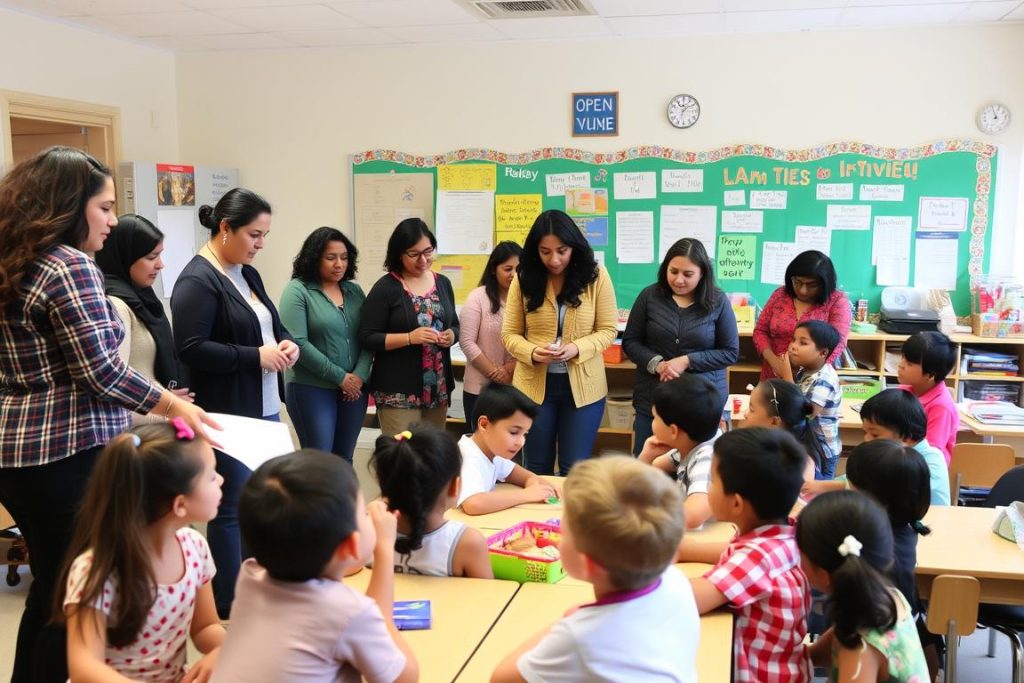
Different families have different capacities for involvement. By offering various ways to engage, you make building parent-teacher relationships accessible to all families, regardless of work schedules or other commitments.
- Host both in-person and virtual conference options
- Create classroom events at different times (morning, afternoon, evening)
- Develop at-home activities that support classroom learning
- Invite parents to share cultural knowledge or professional expertise
- Establish regular office hours when you’re available for quick check-ins
Leverage Technology Effectively
Today’s teacher skills must include digital communication tools that make building parent-teacher relationships more efficient and accessible. The right technology can help you maintain consistent communication without overwhelming your schedule.
- Use classroom apps that allow direct messaging with translation features
- Create a classroom website or digital newsletter with regular updates
- Share digital portfolios of student work with private access for families
- Record short video updates about classroom activities
- Utilize automated reminder systems for important dates and events
Popular platforms like ClassDojo, Seesaw, and Remind have made it easier than ever to maintain regular contact with parents. These tools allow you to share photos, videos, and messages that keep parents connected to classroom activities.
Establish Consistent Routines for Communication
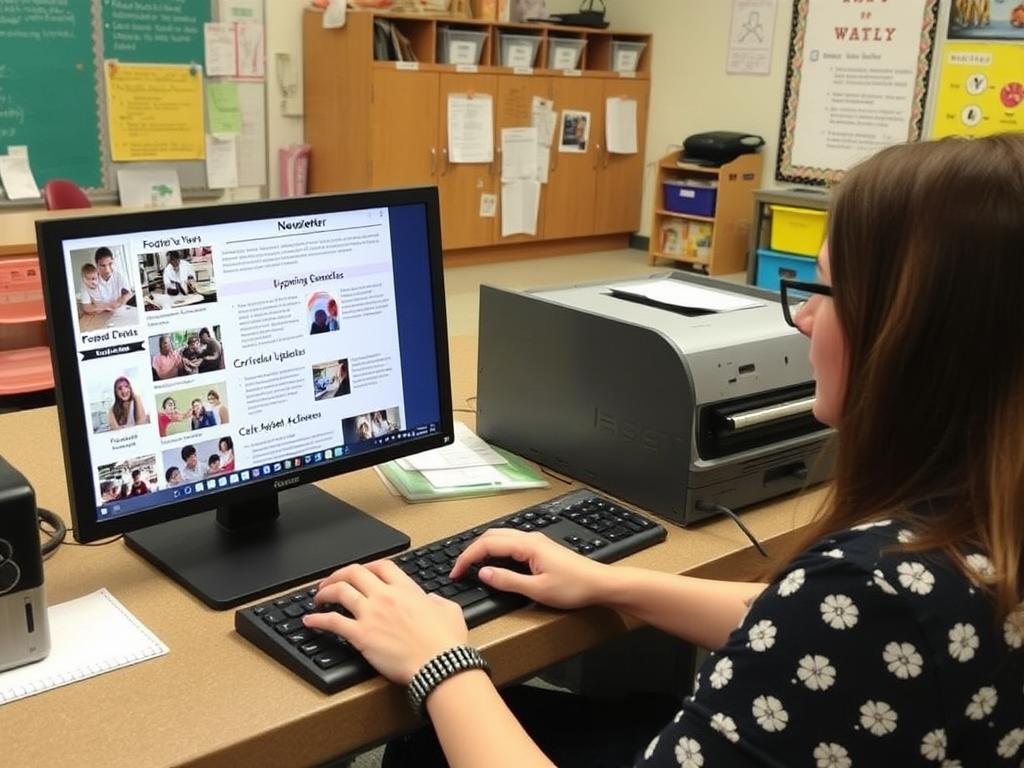
Predictable communication helps parents know what to expect and when. This consistency is a key teacher skill for building parent-teacher relationships that last throughout the school year.
- Send weekly or bi-weekly classroom updates
- Establish a regular schedule for individual student progress reports
- Create a system for communicating homework expectations
- Develop protocols for emergency or urgent communications
- Set clear boundaries about when you’re available to respond
For example, you might send a classroom newsletter every Friday, respond to emails within 24 hours on school days, and schedule individual check-ins once per quarter. This predictability helps parents know when and how to engage.
Include Student Voices
One often overlooked aspect of building parent-teacher relationships is involving students in the communication process. This three-way partnership creates more meaningful engagement and helps students develop ownership of their learning.
- Implement student-led conferences where students present their work
- Have students write reflections to share with parents
- Create opportunities for students to demonstrate learning for parents
- Encourage students to set goals with input from both teachers and parents
When students participate in the communication between home and school, they develop important self-advocacy skills while also strengthening the parent-teacher relationship.
Build Stronger Classroom Relationships
The strategies you use for building parent-teacher relationships complement the skills needed for connecting with students. Explore our courses.
Overcoming Challenges in Building Parent-Teacher Relationships
Even with the best teacher skills and intentions, obstacles can arise when building parent-teacher relationships. Understanding common challenges and having strategies to address them helps maintain positive connections even during difficult situations.
Navigating Cultural and Language Differences
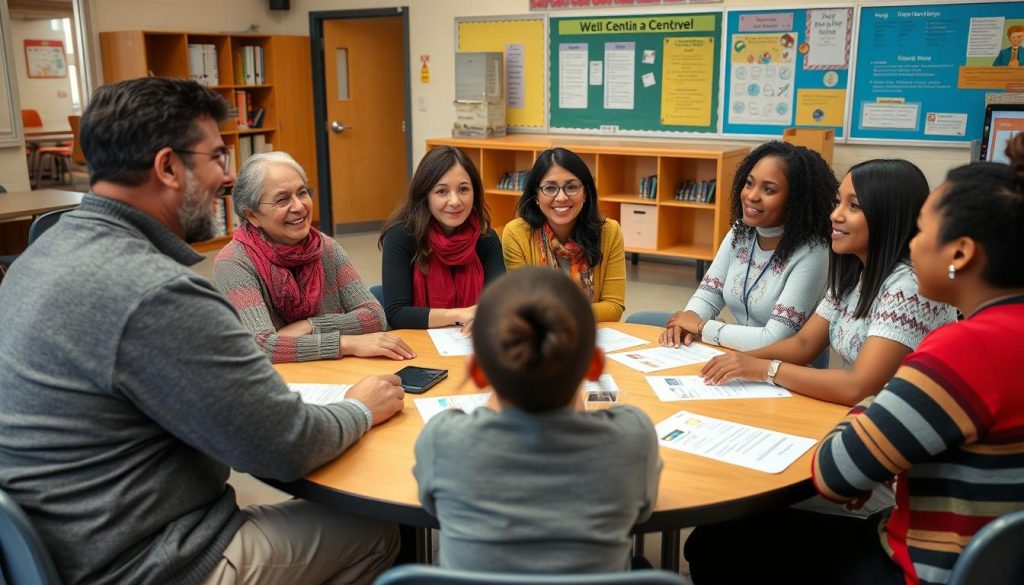
Schools today serve increasingly diverse communities. Developing teacher skills for cross-cultural communication is essential for building parent-teacher relationships with all families.
- Learn about the cultural backgrounds represented in your classroom
- Use translation services when needed (apps, district resources, community volunteers)
- Incorporate culturally responsive practices in your communication
- Be aware of different cultural expectations about education and parent involvement
- Avoid assumptions about family structures or practices
Remember that families from different cultural backgrounds may have varying expectations about their role in education. Some cultures view teachers as absolute authorities and may be reluctant to “interfere,” while others expect more collaborative partnerships. Understanding these differences helps prevent misunderstandings.
Addressing Difficult Conversations
Sometimes building parent-teacher relationships requires navigating challenging topics. Developing teacher skills for productive difficult conversations is crucial for maintaining trust.
- Prepare thoroughly before difficult conversations
- Start with positive observations about the student
- Focus on specific behaviors rather than generalizations
- Present data and examples rather than judgments
- Collaborate on solutions rather than dictating them
- Follow up after the conversation to maintain connection
Approaching difficult conversations with empathy and a solution-focused mindset helps maintain the relationship even when addressing concerns. Remember that parents and teachers share the same goal: student success.
Managing Time Constraints
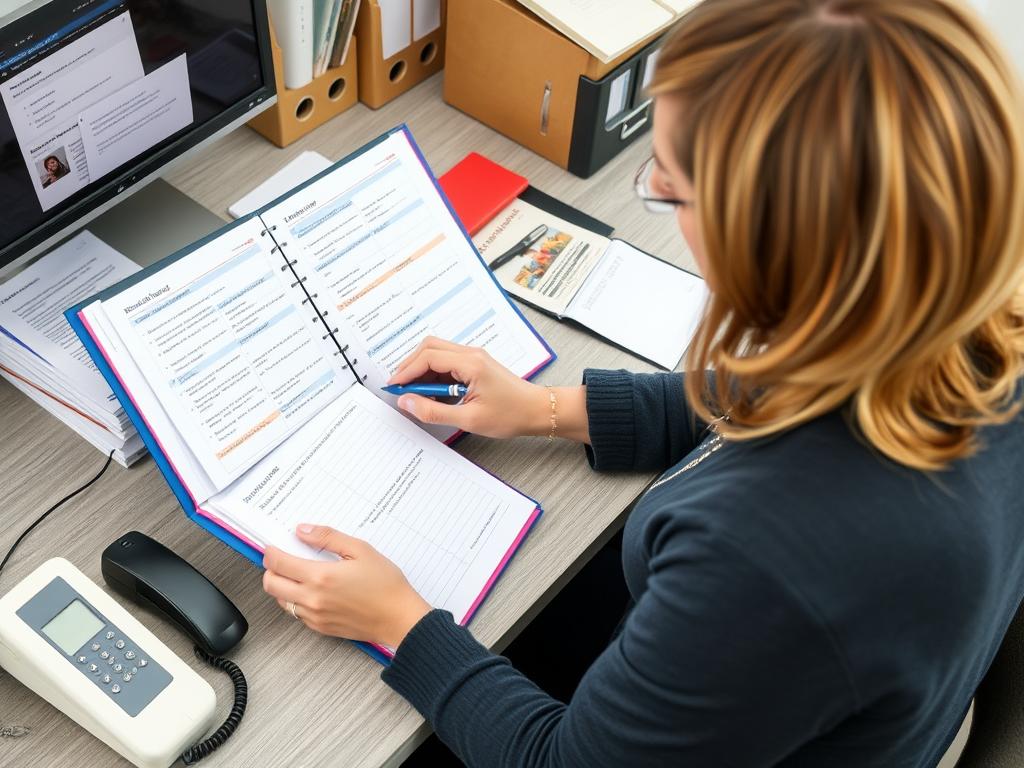
One of the biggest challenges in building parent-teacher relationships is finding time within an already packed schedule. Developing teacher skills for efficient communication helps maintain connections without burnout.
- Create templates for common communications
- Set aside specific times for parent outreach
- Use batch processing for similar communications
- Leverage technology for efficiency
- Prioritize communications based on urgency and impact
Remember that consistency matters more than frequency. A brief weekly update is more effective than sporadic lengthy communications. Focus on quality over quantity in your parent communication strategy.
Develop Advanced Teacher Skills
Want to enhance your teacher skills for navigating challenging situations? Our professional development courses offer practical strategies you can implement immediately.
Measuring Success in Building Parent-Teacher Relationships
How do you know if your efforts at building parent-teacher relationships are working? Developing teacher skills for evaluating relationship quality helps you adjust your approach for maximum effectiveness.
Indicators of Strong Parent-Teacher Relationships
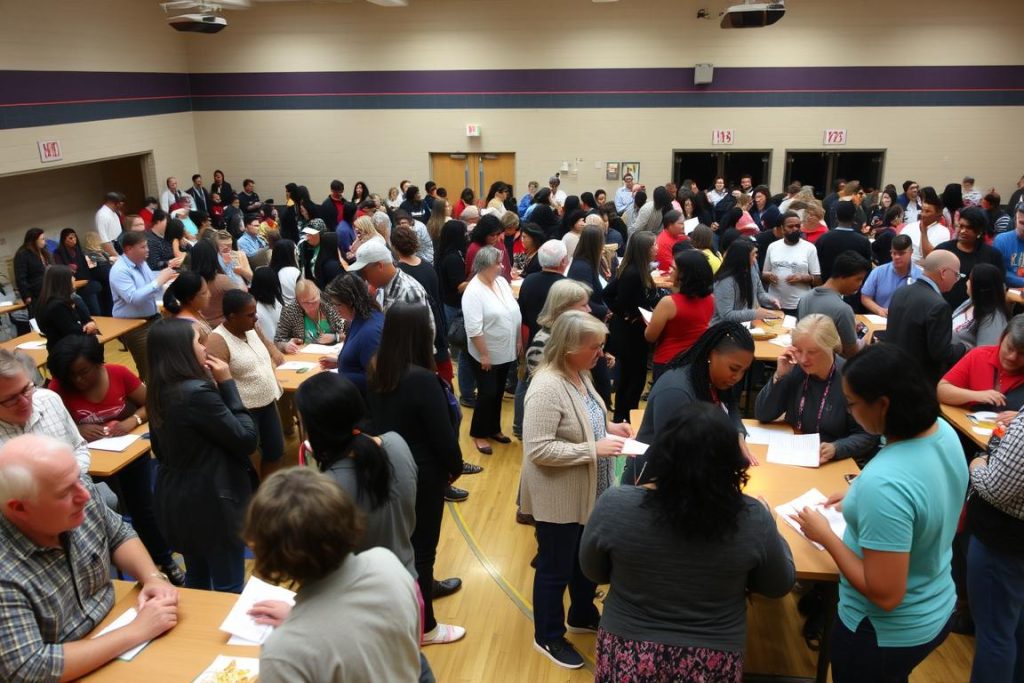
Look for these signs that your parent-teacher relationships are thriving:
- Consistent two-way communication (parents initiate contact too)
- Strong attendance at school events and conferences
- Parents comfortable sharing concerns and asking questions
- Visible parent support of classroom initiatives
- Collaborative problem-solving when issues arise
- Parents referring to previous conversations (continuity)
Gathering Feedback
Systematically collecting parent feedback helps refine your approach to building parent-teacher relationships. This reflective practice is an important teacher skill for continuous improvement.
- Send brief surveys about communication preferences and effectiveness
- Ask specific questions during conferences about what’s working well
- Create opportunities for anonymous feedback
- Pay attention to which communications get the most response
- Track parent engagement metrics (conference attendance, form returns, etc.)
Use this feedback to adjust your approach throughout the year. Different communities and even different families within your classroom may respond better to different communication strategies.
Refine Your Parent Communication Strategy
Looking for more advanced teacher skills in parent engagement? Our specialized courses can help you develop a comprehensive approach to building parent-teacher relationships.
Leveraging Technology for Building Parent-Teacher Relationships in Today’s Classroom
In our increasingly digital world, technology offers powerful tools for building parent-teacher relationships. Developing teacher skills with these digital platforms can significantly enhance your parent communication strategy.
Choosing the Right Digital Tools
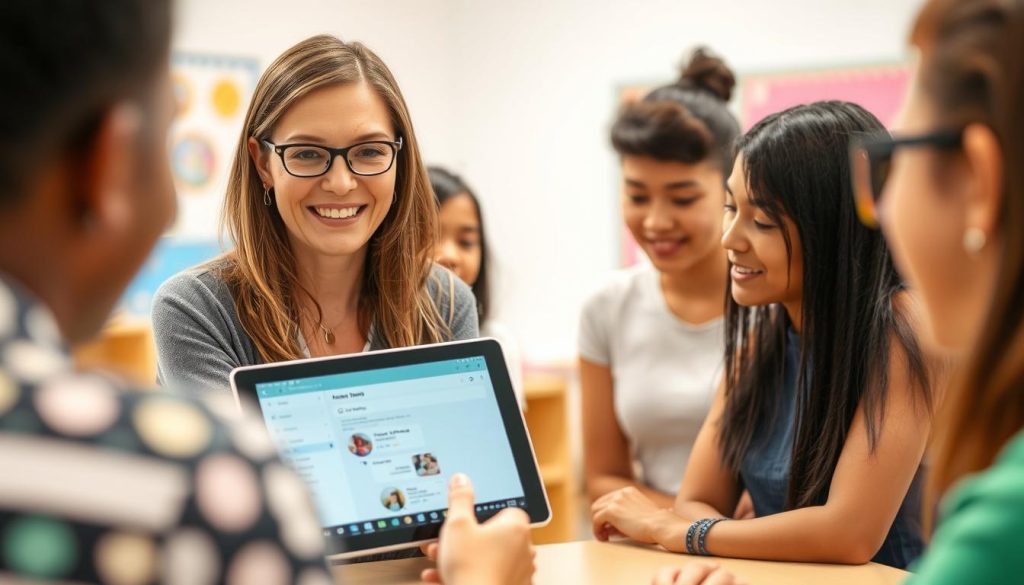
With so many options available, selecting the right digital tools for your classroom requires careful consideration. The best platforms support your specific goals for building parent-teacher relationships.
- Consider your school’s existing technology infrastructure
- Evaluate ease of use for both teachers and parents
- Look for translation capabilities for multilingual families
- Assess privacy and security features
- Choose tools that integrate with your existing systems
- Select platforms that support two-way communication
Popular platforms like ClassDojo, Seesaw, and Remind offer different features that may align better with different grade levels and communication goals. Many teachers find that a combination of tools works best for comprehensive parent engagement.
Best Practices for Digital Communication
Simply having technology tools isn’t enough—developing teacher skills for using these platforms effectively is essential for building parent-teacher relationships in the digital age.
- Establish clear expectations about response times
- Maintain professional boundaries in digital spaces
- Balance text with visual elements (photos, videos, graphics)
- Keep messages concise and action-oriented
- Be consistent with your posting schedule
- Provide tech support resources for parents who need assistance
Remember that digital communication should complement, not replace, personal interactions. The most effective approach to building parent-teacher relationships combines technology with face-to-face opportunities when possible.
Master Digital Communication Skills
Want to enhance your teacher skills with the latest digital tools? Our professional development courses can help you leverage technology effectively for parent engagement.
Building Parent-Teacher Relationships: Your Path Forward
Building parent-teacher relationships is both an art and a science. It requires specific teacher skills that can be developed and refined throughout your career. By implementing the strategies we’ve discussed—from establishing positive communication to leveraging technology effectively—you can create partnerships with parents that significantly enhance student success.
Remember that building these relationships is an ongoing process, not a one-time event. Start with small, manageable steps and gradually expand your approach as you develop confidence in your parent communication skills. Even experienced educators continue to refine their strategies for building parent-teacher relationships throughout their careers.
The time you invest in developing these teacher skills will pay dividends in student engagement, behavior, and academic achievement. When parents and teachers work together as partners, students receive consistent support that helps them thrive both academically and socially.
Continue Your Professional Growth
Ready to take your teacher skills to the next level? Explore our comprehensive professional development courses designed specifically for K-12 educators.
By consistently applying these strategies for building parent-teacher relationships, you’ll create a supportive network that benefits everyone involved—especially your students. The partnerships you build today will create a foundation for student success throughout the school year and beyond.




